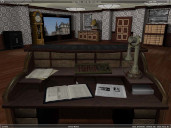Pickles For The Knowing Ones
GearCity's 10th Anniversary!
2020-02-22
Ten years ago today,
I made my first ticket related to GearCity. “Mouse Does
Not Move In
Main Menu.” A humble little issue that stemmed from my
ineptitude
of writing a game engine from scratch. Since that time,
I have
cleared over 6,000 tickets. Written 320,000 lines of
C++, 415,000
lines of GUI script, 400,000 lines of XML, and 150,000
words
(400-page book) of text. Most of which by hand. A
daunting task for a
single person.
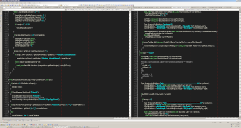
This is where the magic happens.
Over that
decade,
the industry has changed a lot. Two major engines have
gone with a
freemium model. Their tools and designs made game
creation easier,
and it took away many developers working on the FOSS
libraries I
depend on. With a lower barrier of entry to make a game,
developers
made thousands of them. This prompted the largest
PC game vendor
to remove their barrier of entry. And that resulted in
an
oversaturated market where marketing is more important
than just
finishing a game.


If Unity IPO's next year. It's a buy in my books.
Since I started
working on GC, Steam added over 34,000 SKUs to the
platform. 94% of
these launched after GC went for sale on Early Access.
The glut of
games has hurt sales of not only my game, but every
other niche,
mid-sized, and smaller indies. My former publisher went
insolvent
during the Direct era, which led to a yearlong struggle
to regain
financial control of the game. And it lost me nearly a year of revenue in the process.
Product growth
is out pacing new customer growth.
But it’s not all doom and gloom. I’ve been blessed to have 30,000 people purchase the game. Over 70,000 folks, including pirates, demos, and returners have tried the game. Approximately 4,000 users are active every month, and a few hundred players are in the four and five-digit hour playtime range. These are numbers I never dreamed possible when I started working on the game.
I never intended to work on GearCity. I spent ten years in the vaporware game development scene before I started working on an engine for an airship combat simulator. The name of the game was G.A.U., and it was a mixture of Crimson Skies and Silent Hunter. I made a playable demo, but it had major performance and precision issues. I was frustrated with G.A.U. and I just dropped out of college because of a lack of funds. So I found my old cache of floppies while packing and went on a multi-day old game bender.
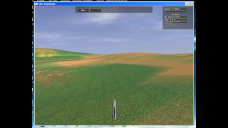
G.A.U: Brightblade never got off the ground as a video game.
But it the miniatures version might live on.
After my binge, I dropped G.A.U. in favor of a business simulator. Detroit, Motor City, Air Bucks, and AeroBiz all had the same problems. 16-bit limitations. There just wasn’t enough there. I thought more depth and content could make these games more challenging for a 22-year-old me. Also, business sims are code-heavy and art light compared to other genres. An excellent way to show off my programming skills as a resume piece since I lacked a degree.
At the time, I was working in automotive parts as a counterman, but also sold exotic car and hard to source parts on the side. Cars and car guys surrounded me every day and didn’t want to go home and work on a game about cars. I wanted to make an Airliner game.
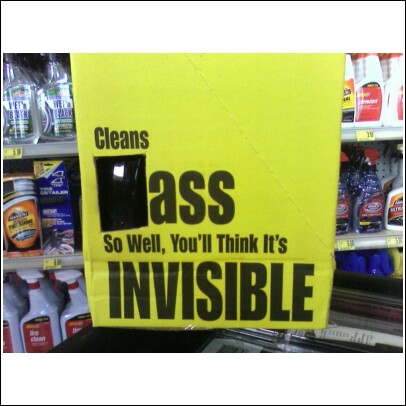
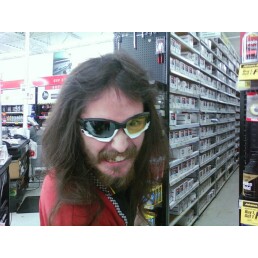
If only I could find the video of me lighting
a
squeegee on fire with brake parts cleaner...
Upon doing my initial market research, I found several well made web-based Airline business simulators that scratched my itch. With this theme as crowded as it was, I turned my attention to making an automobile business simulator.
In 2010, no one was publicly working on games with this theme. The last game with this theme was CarBiz in 2006. The next was Car Tycoon way back in 2001. And you had to go back further to the early 90s to find the games I enjoyed with this theme. A perfect empty market. Exactly what you want to find when you make something.
Automotive
Business Sims had stiff competition in the 2000s.
And so I set off to make GearCity. Early in development, I attempted to recruit some of my AAA artist friends to join me. But sadly, none of them wanted to work on a business simulator. Especially a simulator about cars. (Damn it, Phish!) This set me back a bit. I wanted GearCity to have high-quality artwork, but none of the folks I knew wanted to work on the game. The only way I could get artwork was to do it myself or pay someone to do it. The latter of which was not an option, as I had just dropped out of school because of a lack of funds. So I set out to make GearCity a resume piece primarily focused on writing model simulations and AI. I hoped that I could generate enough buzz to improve the artwork later.
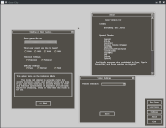
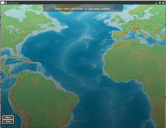
Not much has changed in nine and half years
since
I slapped together the first build of the game.
With a shoe-string budget, I recruited a few people here and there to work on parts of the game that I couldn’t. I picked up an artist who didn’t work out, but we still see his influences in parts of the game. Kristin (Main Tutorial Voice) also started working on music for the game. Her early pieces were OK at best. She stuck around for the longest of anyone and greatly improved her craft. Some of her work on the game is not in the newer builds.
Eventually, in 2011 I came across my main competition, Automation. It was another game, with a similar theme, started at the same time on the other side of the world. The big difference, there were three of them, including a top-notch artist, whereas I was working alone. Knowing I could not compete directly against them, I tried the next best thing... join them.
Their lead programmer rebuffed my overture to merge the two games. I presume because I suggested using my engine instead of theirs. At the time, they only had an engine designer, whereas I had a playable game, minus a designer. The amusing thing is, they fought their engine for years before throwing it away. They eventually rewrote the game for Unreal and switched to technologies I built my game around, SQLite. Had we merged with the manpower, we could have made a seamless transition to next-generation graphics APIs on my engine and upgraded the GUI, without a full rewrite. We would have finished the game years ago. Instead, they’re stuck in development hell as a designer mod tool for a larger game. And I lack funds/manpower to improve the graphical designer or the GUI. It worked out well for them either anyway. I digress.
Seeing how this attempt failed, I
dropped
plans for most of my 3d systems. I doubled downed on the
economic
models and go all-in on the project to get it done. And
at that point
in 2011, I quit my job in automotive retail and started
working on
GearCity full time.
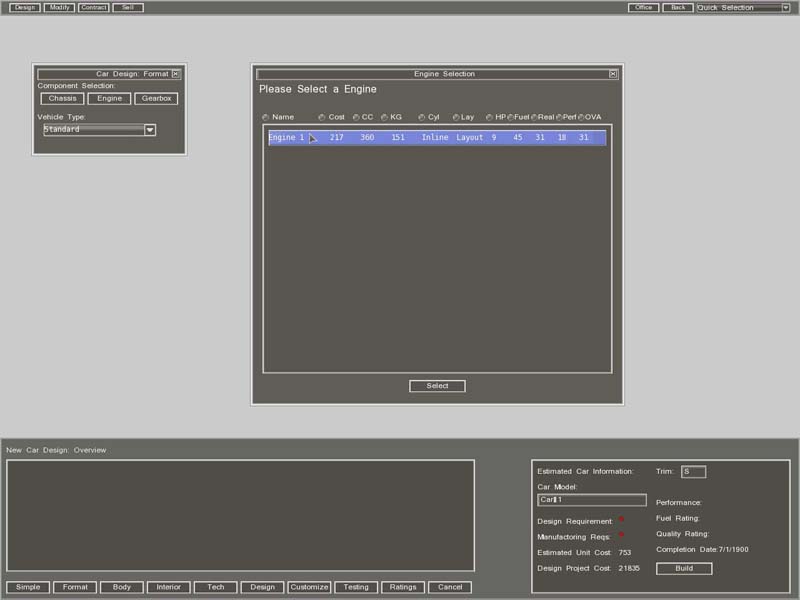
3d Chassis, Engine, and Gearbox designers were cut.
But who knows, maybe they'll be added someday.
In 2012, I took a
part-time job teaching programming and technologies. I
used this
money to seed the development of GearCity. I attempted
to “Crowd
Source” artwork for the game. But Serhiy, Amit, and
Ashwin did most
of the artwork. Because none of these artists communicated with each other, because the pay was low, and because I was ineffective at managing artists across the globe, the artwork turned out bad. Most of it wasn’t how it needed to be. Everyone who
enjoys the game
is very lucky that Serhiy (MrX_ua) stepped up and took
charge of the
remaining artwork for the game. He had to hamstring his
talents to
keep the art direction the same, and he finished everything
we needed,
in time, and in budget. Without him, GearCity would have
failed.
Mostly I
Taught Small Basic.
I also taught a bunch of other stuff too.
Maybe that's another blog post.
In 2013, I founded
Visual Entertainment and Technologies, LLC in
preparation for our
first public Open Beta of the game. On March 28th, 2013,
I released
GearCity 1.0. A few websites picked up the release, and
even the guys
at Automation threw out a Facebook post. (And if they
read this, many
thanks to them for that. That post was the introduction
to my game
for many users.)
The
first review of the game.
Most other early sites that covered GC have bit the
dust. But Indie Retro News is still kicking.
Every
Open Beta Releases
Did you know every Open Beta release of the game is
available on our website?
We signed up to be on the LittleIndie distribution platform, a small-time competitor to Steam. But sadly they went bust before we could launch. The Open Beta and the few sites that covered us led us to sign up with KISS ltd as a publisher.
Another year
passed, and the feds did not renew the grant for my
teaching
contract. So I was forced to monetize GearCity early. We
launched
into Early Access on May 30th, 2014. The publisher
grouped us with
four other titles and did not give us top billing in the
initial PR
push. They also couldn’t give Rock Paper Shotgun the
correct game
key to review the game. None the less, we generated 200
sales in 2
days and 2000 in a month.
RPS
Review.
Bugs, AV Software, and Renderer Crashes, the bane of
my existence that never effects me.
The release was about six months premature, and that killed our initial momentum. The game had many issues, foremost of which was tutorial videos not playing inside the game on modern Windows machines. This issue drove our initial review scores down into the low 70% range, and we suffered ever since.
The next few years were nondescript.
Our
review scores slowly went up. The game did well enough
for me to
continue full-time work, but never good enough to hire
the help I
needed or rewrite the weak points of the game. It seemed
every step
of the way, something would pop up that would reduce
sales. The
biggest of which was Steam Direct.
Player
Count Trend
You can see us slowly getting more and more players
over time.
Besides Steam
Direct’s impact on small and niche indie titles, the new
system
crashed KISS's major selling point, getting your game on
the
platform. In just a few months, the publisher went
insolvent. For the
next year, I struggled with token payments and getting
financial
control of the game back. In short, between Q4-2017 to
Q3-2018, I
made $0 from working on GC. And I had no chance to
recoup it.
When I finally got
full control back of the game, they hit us with the
“October Bug”.
If you haven’t heard of this, in short, Valve changed
Steam
Algorithms to favor better selling games, then tried to
spin it as a
bug when the press got word of it. GearCity’s revenues
dropped by
40%. So not only did I not get paid for almost a year,
when I get
control of finances again, the revenues tank. Talk about
my luck.
I’ll save the financial charts, graphs, and tables for
a future blog post.
Over the last year, Valve has made tweaks to the algorithms, more games have crowded the market, there is more competition in this niche with better graphics, newer engines, and lower time costs. I am developing GearCity on a tired 10-year-old engine. It’s pushed to the max, held together with duct tape, and barely runs on modern OS’s. Technology is moving faster than I can keep up with on this game. I’ve had to get other sources of income and cut expenses. This, in turn, cut my GC work hours down from 80-100 a week to 40-50, mostly 10 pm to 4 am and weekends. Luckily, GearCity is almost finished.
In the next couple of months, I’ll be launching GearCity out of Early Access. Will it be premature? Probably. But I can’t justify working on it as I used to anymore. Does that mean I’ll stop? No way! I imagine I’ll be stuck with this game for another decade. I guarantee bug fixes and technical support for many years to come. I’ll also be attempting to crowdfund some additional features for the game post-release. If that’s successful, who knows, maybe I can add another decade worth of features to the game. More details on that will come soon.
In the meantime, I am launching this blog. As mentioned above, I’m not a social media person. A nice static HTML page, with a link to a forum for comments, is all I need. Speaking of which, until I reopen the official forums for our “Feature Bounty” (crowdfunding) system, the commenting forum will be on Steam. Sorry about that.
And so that is a
little summary of the last 10 years I have spent working
on GearCity.
Over the coming months, I will provide more details
about this
journey. We'll touch on both the economic and technical
aspects of
making the game. I'll point out some things I did well
and some
things I should have done better. For those of you who
have been
playing or played GC, thank you much. I was broke when I
started
working on this game, and I am still broke now. But your
enjoyment
and thousands of others made it worth the while. Thank
you again.

The Original GearCity Icons

Eric
B.
Questions? Comments? Feel free to post them.
